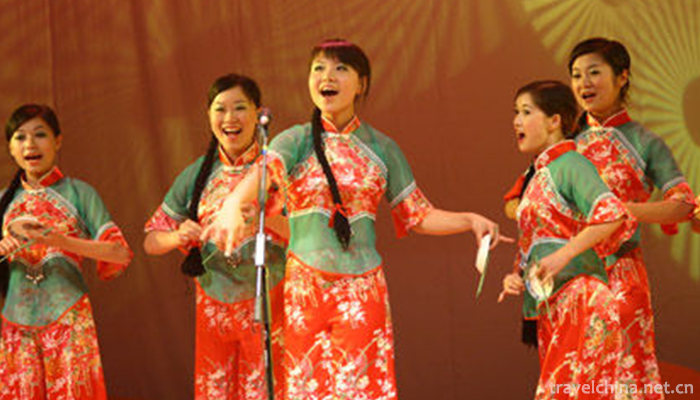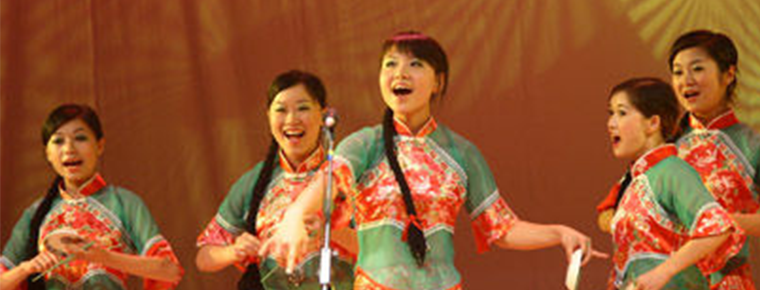Hubei Xiaoqu
Hubei Xiaoqu
Hubei Xiaoqu is one of the traditional operas in Hubei Province. It consists of "Hantan Xiaoqu" and "Tianzhao Xiaoqu". Han Tan Opera, also known as "Hankou Tan Opera" and "Waijiang Opera", is mainly popular in large and medium-sized cities such as Hankou, Shashi and Yichang in Hubei Province, mainly sitting and singing Folk Opera. Tianwu Xiaoqu, also known as "Inland River Xiaoqu", is mainly popular in Tianmen, Qianjiang, Wuyang, Hanyang, Hanchuan and other counties and villages in Hubei Province along the Hanshui River. It is famous for playing traditional folk minors on dishes.
On June 7, 2008, "Hubei Xiaoqu" declared by Wuhan City of Hubei Province was listed in the second batch of national intangible cultural heritage list with the approval of the State Council.
historical origin
Hubei Xiaoqu is a kind of Hubei Opera, commonly known as Hantan Silk String and Waijiang Xiaoqu. The folk songs of Ming and Qing Dynasties spread in the central part of Hubei Province evolved. During the Guangxu period, Tianmiao Xiaoqu artists began to work with Hantan Xiaoqu artists, and entered the teahouse to sit and sing, gradually merging into one. And gradually prevailed in Hankou, Wuchang, Huangshi, Shashi, Jiangling, Yichang, Jiujiang and other places along the Yangtze River. In the 1920s, it was renamed Hubei Xiaoqu. During the War of Resistance Against Japan, when Wuhan was occupied and Xiaoqu artists fled, Xiaoqu from Hubei Province was spread to remote areas and became an influential major type of music in Hubei Province. Spread in Wuhan, Shashi, Yichang and other urban wharfs.
Hubei Opera of China. Around the end of the Qing Dynasty, it was composed of Hantan Xiaoqu and Tianwu Xiaoqu, which were popular in central Hubei. Singing tunes are rich in cards. They are composed of Nanqu, Wenci, Xiqiang and Tanhuang. They are composed of more than 100 folk songs. Singing is mainly sitting, standing and walking. Sitting singing is divided into single, double and multi-person, mainly composed of two-person sitting and singing, with male and female partners. Actors and actresses play Sihu, while actresses fight festivals with clouds. Traditional repertoires include Nanqu's "Grabbing Umbrella", "Qiujiang", "Tiaofen Wall", Xiqiang's "Yinhong", "Wangxianglang" and so on; Songjiang's "Killing Cherish" and "An'an Sending Mi" in the lyrics. After 1949, Lei Feng joined the army, Jiang Jie entered the mountains and so on, which made Hubei Xiaoqu art get new development.
Inheritance significance
Hubei Xiaoqu, like other rap music, is in danger of extinction. Traditional folk culture faithfully reflects the development of the Chinese nation for thousands of years, and is a main thread of national culture. In the footsteps of the times began to produce a strong shock wave today. How to retain the "root" is a question that every descendant of the Yellow Empire needs to think about. In order to carry forward the national culture, protect and rescue the music heritage, explore the laws of traditional music, inherit and develop the traditional Chinese humanistic spirit. In the long-term development of Hubei rap music, each kind of music has formed its own rich moistening skills, learning and mastering these moistening skills, which play an important role in the singing, creation and compilation of rap music, and also have important reference value for the creation, singing and teaching of national vocal music works. Especially, Hubei Xiaoqu is good at lyricism, narration, rigidity, softness, delicacy and euphemism. Special attention should be paid to the use of various techniques to embellish the tune so as to make it more colorful and vivid.


-
1.Steamed perch with scallion and black beans
Steamed bass cooking techniques are mainly steamed dishes, and their taste is salty and fresh. Steamed perch is one of the famous traditional dishes in Guangdong province
Time 2018-11-02 -
2.Guanyin Mountain National Forest Park Guangdong
Guanyinshan National Forest Park in Guangdong Province is the first National Forest Park in Dongguan City approved by the State Forestry Administration. It is located in Zhangmu Town, Dongguan City
Time 2019-01-13 -
3.Yuanshan National Forest Park
Yuanshan National Forest Park is located in the southwest of Boshan District, Zibo City, Shandong Province. It was established in 1992 with the approval of the Ministry of Forestry.
Time 2019-03-09 -
4.Tibetan drama
The Tibetan name of Tibetan opera is "Aguiram", which means "fairy sisters". According to legend, Tibetan opera was first performed by seven sisters. The content of the opera is mo
Time 2019-04-05 -
5.The Dragon Boat Festival
Dragon Boat Festival, also known as Dragon Boat Festival, Double Boat Festival, Midday Festival, Dragon Boat Festival, Zhengyang Festival, Bath Orchid Festival, Tianzhong Festival,
Time 2019-04-28 -
6.The Making Skills of Hui Ink
Hui ink production technology, Jixi County, Shexian County, Huangshan Tunxi District, Anhui Province, local traditional handicraft, one of the national intangible cultural heritage.
Time 2019-05-04 -
7.Drama Costume and Opera Production Skills
Drama costume and costume production skills, local traditional handicraft in Suzhou City, Jiangsu Province, one of the national intangible cultural heritage.
Time 2019-05-08 -
8.Shizhu Tujia Luoer Diao
Shizhu Tujia Luoer Diao originated from Shizhu Tujia Autonomous County, Chongqing. It is a folk song of Luoer tune, which is popular among the Han and Tujia nationalities in southeastern Chongqing. It
Time 2019-06-15 -
9.Tianmen Folk Song
Tianmen folk song is the traditional folk music of Hubei Province. Tianmen folk song has its unique style characteristics. It is not as rough and elegant as plateau folk song, nor as broad and long as
Time 2019-06-20 -
10.Tu Costume
Women usually wear embroidered small collar and long slant-skinned shirt. The sleeves are made of red, yellow, orange, blue, white, green and black seven-color cloth rings. They are bright and beautif
Time 2019-06-23 -
11.Bai Qi
White(Bai Qi)(? - 257 BC). He is a man in the village of Bai village, Chang Xing Town, Mei County, Shaanxi today. Outstanding military strategist and representative of "military strategist"
Time 2019-09-11 -
12.Neijiang science and technology
In 2019, Neijiang City completed 195 science and technology projects above the municipal level, and applied for 2509 patents and obtained 1425 authorized patents, including 456 invention patents and 90 authorized invention patents. At the end of the year, there
Time 2020-12-16